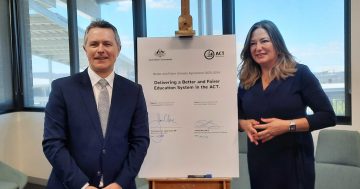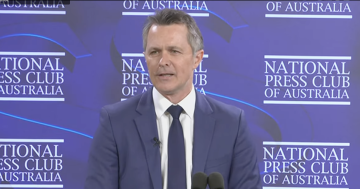
Education poses interesting questions about the Federal Government and its relationship with states and territories. Photo: File.
Australia’s National Assessment Program for Literacy and Numeracy – NAPLAN – is currently receiving lots of attention again, and not because of any positive results found in the 2023 report.
While the newly released data shows one in three Australian students is not meeting minimum standards and that one in ten needs extra help, about 65 per cent are doing very well.
Predictably, the more negative numbers are attracting all the attention, reigniting the ongoing debate about how necessary NAPLAN is.
This year’s test had a number of changes introduced at the direction of the Education Ministers Meeting, which oversees the program.
Changes included bringing the date of the test forward and modifying the way the results are reported.
New NAPLAN is still administered to students in years 3, 5, 7 and 9, but now they are graded against four levels of proficiency – exceeding, strong, developing and needs additional support – based on previous years of schooling.
Assessment for his year’s test was through a somewhat tougher set of criteria.
This is the result of changes education ministers made this year to the NAPLAN minimum standards, deliberately raising the bar students are expected to meet.
On the release of the data, Federal Education Minister Jason Clare said the changes to NAPLAN were made to ensure students who need additional support are properly identified so they can be given it.
“The evidence shows if you have fallen behind at school it’s really hard to catch up,” he said.
“Only one in five students who are behind the minimum standard in literacy and numeracy in Year 3 are above it in Year 9. This is what we have got to fix.
“Early identification and intervention is critical.”
Yet with all the debate over the data’s ranking of schools, the stress on students, and the tug-of-war over funding, questions are also (again) being asked about the Commonwealth’s role – and intervention – in the education of our kids.
The Constitution gives the Federal Government no specific power to pass laws relating to education.
The operation and regulation of education in Australia is the responsibility of the states and territories, as is the funding of it.
But as we know, the Commonwealth does help to fund schools and with federal money comes federal power.
So Canberra has long played a role in school-based education despite it being the jurisdiction of state and territory governments.
NAPLAN was introduced in 2008 and the Australian Curriculum, Assessment and Reporting Authority (ACARA) has managed the tests since 2010.
ACARA is an independent statutory authority and it was charged with the development of a national curriculum, a national assessment program, and a national data collection and reporting program for Australian students
From 2014, the Commonwealth began playing an even greater role with the establishment of the Australian Curriculum.
According to ACARA, the Australian Curriculum is based on the principles of improving the quality, equity and transparency of Australia’s education system.
The Federal Education Minister meets regularly with his state and territory counterparts – the Education Ministers Meeting – to discuss policy and set strategies for the nation’s education.
Such meetings came up with the National School Reform Agreement and late last year, ministers jointly agreed to establish a review panel to inform its next phase.
The review will inform education ministers on reform priorities for the nation’s education system.
But there’s the rub. In reality, there actually isn’t a national education system.
“Our hands are pretty tied at the Commonwealth level,” one Federal Government source told Region.
“We have input, yes. But it’s the domain of the states. We have programs, but they have to deliver them.
“We will often get the blame for failures – and not just from parents, teachers and students, but often from the state and territory governments themselves.
“But education is their responsibility.”
That’s where funding plays a more significant role than it probably should.
If the Commonwealth is called on to cough up – as it is – then the Commonwealth will have its say.
That’s long been entrenched, but so has the frustration of delivering better outcomes for students.
As another source told Region: “Education – it’s a conundrum of our federation.”
Original Article published by Chris Johnson on Riotact.











